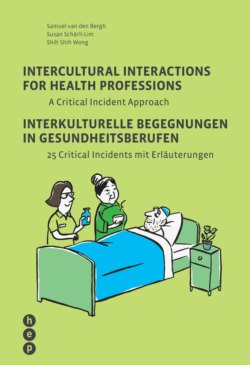Читать книгу Intercultural Interactions for Health Professions / Interkulturelle Begegnungen in Gesundheitsberufen (E-Book) - Samuel van den Bergh - Страница 10
На сайте Литреса книга снята с продажи.
CRITICAL INCIDENT 4: Infant Formula
ОглавлениеMrs Lee, a 24-year-old Chinese immigrant, has lived in Switzerland for about a year. Mr Lee is a computer specialist and works for Google. In the initial interview with the midwife, Mrs Lee mentioned that they do not have much contact with the locals and live a rather secluded life.
Mrs Lee has just given birth to her first child, a daughter. The midwife asks Mrs Lee in which position she would like to breastfeed her child. Mrs Lee vehemently refuses to breastfeed. When asked the reason for not breastfeeding, Mrs Lee replies in broken but understandable German that she would rather give the baby formula milk and mentions a Swiss brand that she knows from China.
The midwife would like to explain the importance and advantages of breast milk and breastfeeding but is unsure how to approach the subject.
What is (are) the possible reason(s) for Mrs Lee’s refusal to breastfeed her baby?
Please select the alternative(s) which could be the explanation(s) for the refusal
1.Mrs Lee does not want to breastfeed because it is a baby girl. In Chinese traditional cultures, a baby boy is considered more valuable than a baby girl.
2.Mrs Lee explains that her mother also bottle-fed her child, as did her grandmother.
3.Mrs Lee is worried that her nipples would get sore from latching and she could get mastitis.
4.Mrs Lee believes she is doing the best for her child. Chinese mothers have been exposed to years of aggressive advertising promoting formula milk by Western international companies (including Swiss).
Analysis
1.This is not the correct answer, although the male-female birth ratio has been skewed due to the Chinese one-child policy that lasted for 35 years (Phillips, 2015). Since then the rule has been amended to allow each couple to have two children. During the enforcement of the one-child policy, extreme measures such as sex-selection abortion, infanticide at birth and infanticide through neglect were often used to ensure that the one child is male. It would not be constructive to assume that the baby girl is not welcomed. Mrs Lee insists on formula milk and knows which brand she wants; the welfare of her child is obviously of concern to her.
2.This explanation is likely, but there is a better answer. Nevertheless, there is firm evidence that childbirth and nursing experiences handed down within families exert considerable influence on the attitude of new mothers towards birth and breast-feeding. In addition, for many Chinese the elderly are highly respected.
This would be very relevant in a culture based on «communitarianism», which is still practised in China, as opposed to «individualism». In a communitarian society, harmony and cooperation are valued (Trompenaars & Hampden-Turner, 2012). Unproven negative experiences regarding childbirth and nursing could be shared and accepted by the entire family as a fact. The woman as an individual does not play a role in this closely-knit community and an individualistic idea such as breast-feeding could be seen differently by some women. Thus, the idea will hardly be entertained.
3.This is not the correct answer but contains a grain of truth. In China, women are expected to treat themselves with great care during the first four weeks postpartum (Galanti, 2014). Traditionally, children are looked after by close family members so that the new mother can rest. The postpartum period is seen as a delicate phase where the body undergoes many changes because of injuries related to giving birth. According to Chinese tradition, diseases contracted in this phase can only be healed by a healthier experience in the next postpartum phase, i.e. after the birth of the next child. This is particularly traumatic in view of the one-child policy.
Traditionally, new Chinese mothers keep themselves well covered (including a hat or scarf) to prevent disease caused by wind. The element wind is considered to be responsible for carrying and causing illnesses. In Swiss hospitals, draughts are frequent and are cause for concerns from a traditional Chinese point of view (Galanti, 2014).
4.This is the best answer. According to the UNICEF Report 2012 for China and a recent study in 2014, aggressive formula milk advertising has influenced Chinese women’s choice of baby nutrition, shifting from breast-feeding to the use of formula milk (Tang & Lee, 2014). Chinese women believe western nutritional products are superior to breast feeding.
